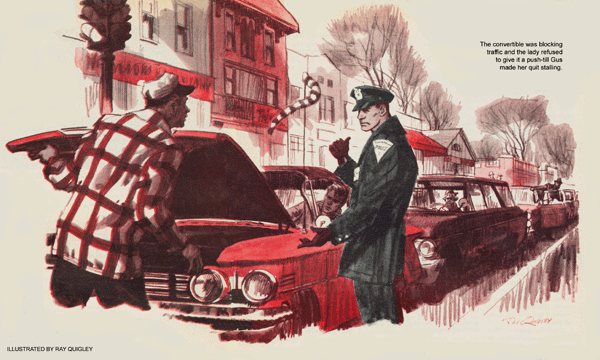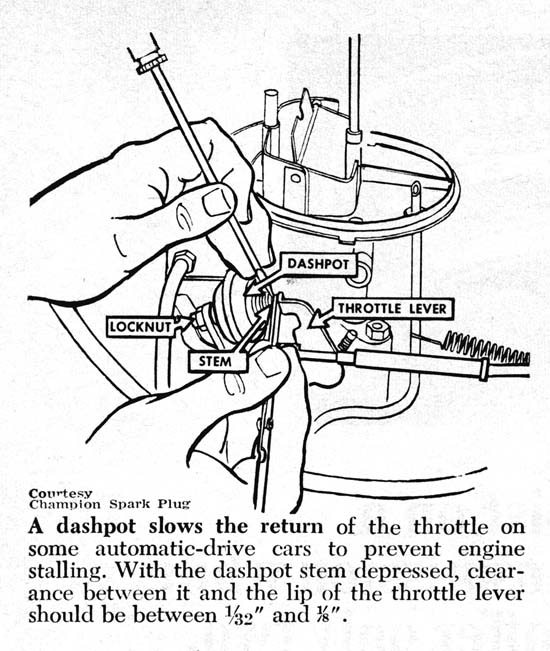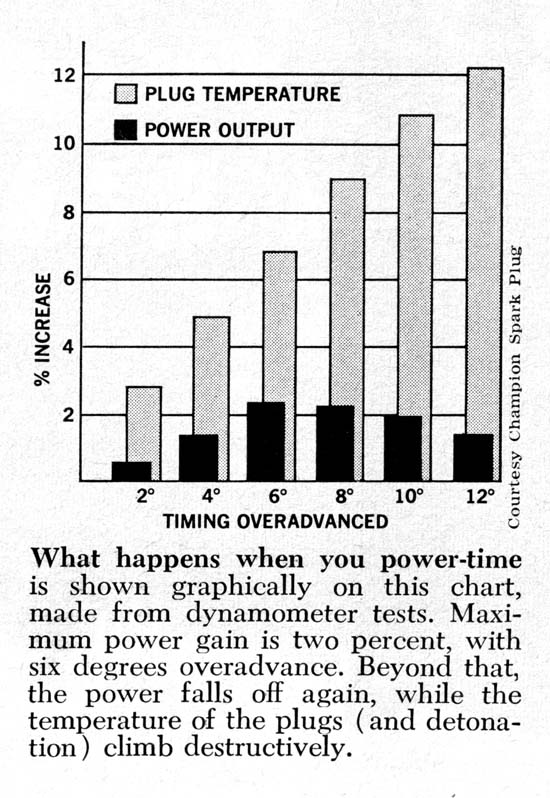February 1965
GUS BREAKS UP A TRAFFIC JAM
by Martin Bunn
Instantly, the engine started.
"Okay, now move,"
the rookie cop ordered.

Coming out of the parts shop with some gaskets, Gus Wilson headed briskly for his Model Garage wrecker at the curb. Snow crunched underfoot. Appreciatively he tasted the crisp, smoke-scented winter air, while eyeing the lively village traffic. Then it happened -- in seconds.
As the cross light turned amber, a small foreign sedan bustled up, entering the intersection on the verge of the red. Getting the main-street green, a convertible leaped away, and immediately braked to let the sedan squeeze by. A station wagon behind the convertible started with a jerk and rammed the convertible. The little sedan scooted out of sight.
It wasn't a serious accident. But the rookie policeman at the corner at once bore down on it. Watching him come, the driver of the convertible planted it firmly in the intersection and emerged with a belligerent air. He was a young man with a square-jawed face that would have done justice to a Roman centurion. The white-haired woman driving the station wagon sat perfectly still.
The rookie cop eyed the back of the convertible and the front of the wagon appraisingly. "Doesn't seem to be any damage," he said. "Better move on."
Growling in his throat, the young man got back into his car. Its starter whirred, the tiger tail of its whip antenna quivering in response. The engine fired, but as quickly died. Jaw set the driver turned the key again, with the same result.
"Come on," urged the rookie. "You're blocking traffic." He waved an angry hand.
Again the starter ground. There was an explosive response, but the engine didn't catch. The driver looked back at the wagon.
"How about a push? He yelled.
"You willing to push him, lady?" asked the rookie. "I'll hold traffic for you.
The woman sat up straighter, but shook her head. Gus tossed the gaskets into the wrecker and approached the convertible.
"She stalled when I slammed on the brakes," said the driver. But it'll run if I can get a fast push."
"Mind if I try something?" asked Gus.
"Be my guest," the man replied moodily.
Gus opened the hood. The trouble could be anything from fuel failure to a bad coil.
Playing a hunch, he disconnected the vacuum line to the spark advance and shut its open end with a finger.
"Okay, crank it now," he yelled.
The driver turned the key. Instantly the engine was running. Gus slipped the vacuum line back on and closed the hood.
"Hey, what'd you do? demanded the driver. "I been havin' a hard time -- "
"Okay, break it up," ordered the rookie ungraciously. "Now move."
The convertible moved.
With ponderous dignity, the policeman walked back to the station wagon.
"You too, ma'am. Go ahead."
"No, indeed!" said the woman firmly.
She was so small that her head scarcely rose above the wheel. Her blunt refusal was as surprising as a bark from a kitten.
"Huh? Why not?" demanded the rookie.
"I've just come from a service station because my engine was stalling. They did something. Now it doesn't stall, but every time I put it in Drive the car almost gets away from me. This is my very first accident, and I will not drive this car another block in this condition."
With traffic detouring around the wagon, the rookie looked appealingly at Gus.
"Just start the engine?" asked Gus.
It roared into action as he raised the hood-and kept on roaring, at far too fast an idle for an automatic drive. The fast idle cam was backed off normally, but somebody had set up the idling adjustment too far. With his pocket screwdriver Gus reset it until the engine idled sensibly, then closed the hood.
"It won't jump forward now," he told the woman. "But it may stall again at times. If it does, have an agency or garage check it. No, there's no charge," Gus added as she produced an enormous pocketbook.
"That's very kind of you," she said. "I'm only here on a visit, so I didn't have a garageman --until now. I fancy I can find you where it says on your truck."
Gus nodded. The woman flipped down a lever and the wagon slid smoothly away.
"Thanks, Mr. Wilson," said the rookie.
Gus made one more stop before returning to the Model Garage. Standing by the door was a tiger-tail convertible. Its driver stopped pacing to stamp out a cigarette.
"My name's Joe Murch," he said as Gus alighted. "You must be Gus Wilson."
"That's right," Gus glanced at the convertible, now running at a fast idle and roughly.
"That cop never gave me time to ask -- I gotta know what you did back there. This mill has been starting hard for a couple of days."
Gus shrugged. "The way it sounded when it tried to start, I'd say that your timing was overadvanced. Firing too far ahead of top dead center, the pistons were kicking back. You know why you disconnect the vacuum advance when you use a timing light?"
"Yeah. To make sure there's no vacuum on the diaphragm that advances the spark."
"That's right," said Gus. So I disconnected the line figuring that might drop the timing back a hair -- just enough to get you started."
The young man frowned. "I power-timed it a week ago. Borrowed a timing light to set it 12 degrees before top dead center, and got me a few extra horses. But it started okay, until yesterday."
"Maybe something advanced it more," suggested Gus.
"Like what? I tightened the distributor real good." Murch threw up the hood, grasped the distributor and twisted it with all his strength. "See that? It's still tight. I haven't touched a thing since but the points."
Gus grinned. "When? Yesterday?"
"Yeah. So what?"
"Better borrow that timing light again," advised Gus. "I'd almost bet you'll find the timing ahead of where you set it."
Murch stared at him. "It's a bet! You check it. If it's more than 12 degrees ahead. I pay you to reset it. If not, no charge."
"Guess I walked into that," said Gus.
Before Gus could enter the shop a station wagon rolled briskly up the apron-the same wagon that had nudged Murch.
"It was easy to find you, Mr. Wilson," called the driver. Everybody knows you. I am Mrs. Leonard Phipps."
"Still having trouble, Mrs. Phipps?"
"It's stalling again, as you said it might. I do hope you can stop that."
"If you'll wait -- " began Gus, knowing his helper Stan had a rush job to finish.
"Aw, go ahead," interrupted Murch. "I can wait, especially since it's going to be free."
Mrs. Phipps drove in. Hooking up his tachometer, Gus set the idle at the recommended r.p.m. figure for her automatic-transmission car. Then he gunned the engine briefly and let the throttle snap shut.
The engine promptly stalled.
Disconnecting the tach, Gus hooked the two alligator clamps of a portable oscilloscope to the battery, clipped a sleeve terminal on the center distributor cable and another to a plug cable.
With the engine running again, he watched the hooded face of the scope tube as six luminous traces rose to varying heights from a base line. Gus opened the throttle suddenly, revving up the engine. Even under the higher compression of sudden acceleration, things looked good. The traces remained below the level red-lined for excessive voltage, indicating no worn or too widely gapped plug. Nor was any trace significantly short, signaling a fouled one.
Detaching the instrument, Gus gunned the engine again and watched the throttle lever snap back. The engine gasped but kept running. Once more Gus opened and suddenly released the throttle. As it snapped shut, the engine stalled.
The young man watched skeptically as Gus pushed back the end of what resembled a vacuum-diaphragm housing. "What's that?"
"A dashpot," replied Gus, eyeing the quarter inch gap between the depressed stem of the unit and the throttle lever lip. Loosening a locknut, he screwed out the dashpot until the clearance was less than an eighth.
"You find dashpots on some automatic-drive cars," he went on. "They slow throttle closing, so the engine won't stall at the low idle you need to prevent creeping. This one was out of adjustment.
Restarting the engine, Gus again opened and suddenly released the throttle. It hit the dashpot stem, was slowed, and closed with feather softness. Gus got into the car, put it in Drive, and holding the brake on, repeated the test several times.
"It's okay now, Mrs. Phipps."
"Fine. But this time," she said firmly, "I insist on paying. And no argument."
Gus didn't argue.
Murch drove his car in as the wagon rolled out. Gus unhooked and plugged the vacuum advance line, then hooked up his tachometer and set the throttle at 850 r.p.m., the correct speed for timing the convertible's engine. He connected the timing light and in its flash read the chalk whitened marks on the crankshaft damper. The pointer was well past the 10-degree mark.
"I never set it that far ahead."
"It's nearer 14 than 12, that's sure. But 5 degrees is right not 12. Now, wait." Said Gus as Murch started to protest. "Of course timing makes a big difference in power -- if it's 5 degrees late, you can lose 35 horses in a 200-horse engine. But you fellows who power-time are kidding yourselves. Know how much extra you get if timing is over-advanced seven degrees? Two percent!"
"But with seven degrees overadvance, plug temperatures climb eight percent. Cylinder temperatures go up, too. You may not hear any detonation knock, but it's slamming around the guts of your engine, punishing pistons, rods, and valves. Any time you buy gas a few octanes lower, detonation gets worse. Ditto as carbon builds up."
"You win," mumbled Murch. Set it back. But what moved it up?"
Stopping the engine, Gus took off the distributor head. "Yesterday you adjusted the point gap -- wider. Right?"
"Sure. How could that advance timing?"
"Increasing the gap is the same as decreasing the dwell angle -- the length of arc in which the cam leaves the points closed. That means the cam breaks the contacts a little earlier in its rotation."
Gus checked the point setting. "The gap is all right. But it was smaller when you set the timing. When you increased the gap, the effect was to advance. Any time you adjust points, the timing should be checked afterwards."
Gus started the engine and carefully set the distributor to line up the timing pointer at the center mark. With the vacuum line reconnected, he adjusted the idle. When the engine revved up, the timing mark crept up smoothly.
"That's how I'd set my own car," said Gus, unhooking the light. Regular tune-ups will do more for you than power timing."
"Funny thing, but I found out some things I wouldn't have, if that dame hadn't bumped me," admitted Murch.
"That's how we learn," Gus said with a grin, "in the school of hard knocks."
END

